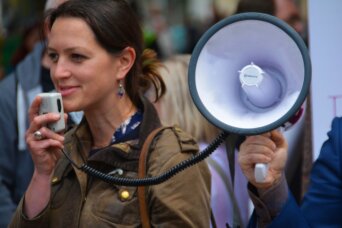- About
- Topics
- Picks
- Audio
- Story
- In-Depth
- Opinion
- News
- Donate
- Signup for our newsletterOur Editors' Best Picks.Send
Read, Debate: Engage.
| topic: | Democracy |
|---|---|
| located: | Serbia |
| editor: | Katarina Panić |
Unlike the public broadcaster RTS in Serbia, the Balkan affiliate of CNN went live on Tuesday night covering the spontaneous protests in Belgrade. Several thousand people gathered in front of the parliament after President Aleksandar Vučić announced a weekend curfew in the capital again. TV N1 reporter Jelena Zorić stopped a young man to ask why people don't stop the demonstration, which had become heavily violent.
"Tear gas, live rounds, batons, everything against barehanded youth. Dad, this is for you (Ćale, ovo je za tebe), who died while there were no ventilators," a young man answered weeping.
President Vučić described the protesters as criminal hooligans, adding the lack of respirators claims were a notorious lie. Petar Đurić then published his father's medical history report that indeed admits "lack of free places." It turned out "Dad, this is for you" had become one of the slogans of protests currently ongoing in largest cities in Serbia. Live footage showing the police beating people and using excessive force, with attacks on journalists and women as well, flooded the networks.
Serbia had some of the strictest lockdown measures in Europe, including whole several weekends under curfews. All of a sudden, all restrictions were released ahead of the elections on June 21. The media worldwide reported on football games in Belgrade, not in terms of the score but the presence of thousands of people gathered together. Political parties held rallies; the government claimed that the pandemic is fading down. The BIRN investigation showed that the government was deliberately misinforming the public and falsifying the COVID-19 statistics.
On Thursday Vučić backtracked on lockdown plans, but his government then introduced strict restrictions on public gatherings. Although they explained them as an effort to contain the spread, it is obvious they attempted to prevent the demonstrations from taking place not only against the handling of the pandemic but against Vučić's dictatorship.
The same night the protesters adopted a sit-in tactic and decided to wear white T-shirts to separate the peaceful majority from undercover police and provocateurs who were trying to discredit them. The new refrain appeared: sit down (sedi dole).
"People are not against the measures; people are against the fact that the government played with the Serbian people. They are sick and tired of being treated as fools," Fabian Vendrig, Belgrade-based journalist, tweeted.
Image by Dean Moriarty

